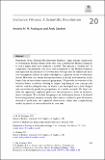Files in this item
Inclusive fitness : a scientific revolution
Item metadata
| dc.contributor.author | Rodrigues, Antonio | |
| dc.contributor.author | Gardner, Andy | |
| dc.contributor.editor | Dickins, Thomas | |
| dc.contributor.editor | Dickins, Benjamin | |
| dc.date.accessioned | 2022-10-05T10:28:31Z | |
| dc.date.available | 2022-10-05T10:28:31Z | |
| dc.date.issued | 2023-03-09 | |
| dc.identifier | 281576049 | |
| dc.identifier | f0380e38-ba12-4fc2-99b0-e46f339992ef | |
| dc.identifier | 85149997742 | |
| dc.identifier.citation | Rodrigues , A & Gardner , A 2023 , Inclusive fitness : a scientific revolution . in T Dickins & B Dickins (eds) , Evolutionary biology : contemporary and historical reflections upon core theory . Evolutionary biology – new perspectives on its development , vol. 6 , Springer , Cham , pp. 343-360 . https://doi.org/10.1007/978-3-031-22028-9_20 | en |
| dc.identifier.isbn | 9783031220272 | |
| dc.identifier.isbn | 9783031220302 | |
| dc.identifier.isbn | 9783031220289 | |
| dc.identifier.issn | 2524-7751 | |
| dc.identifier.uri | https://hdl.handle.net/10023/26131 | |
| dc.description | Funding: Natural Environment Research Council (NE/K009524/1) and European Research Council (771387). | en |
| dc.description.abstract | Proponents of the “Extended Evolutionary Synthesis” argue that the current state of evolutionary biology departs from what was established in Modern Synthesis to such a degree that a new synthesis is needed. They present a “laundry list” of complaints concerning the core focus and assumptions of the Modern Synthesis and argue that the perspective of evolutionary biology must be shifted and these core assumptions relaxed in order to incorporate a plethora of new evolutionary factors. However, we contend that this revolution is already well underway, in the form of the inclusive-fitness research programme. We provide an overview of the inclusive-fitness revolution, charting its origins, explaining its core concepts and outlook, and describing the ways in which it has developed into a fully fledged and extraordinarily productive programme of scientific research. We then consider the apparently neglected processes and perspectives from an inclusive-fitness viewpoint. We conclude that progress in evolutionary theory is facilitated by focusing research attention on areas where there is a relatively poor fit between theoretical predictions and empirical observations, rather than complexifying models in pursuit of extra realism for its own sake. | |
| dc.format.extent | 18 | |
| dc.format.extent | 456237 | |
| dc.language.iso | eng | |
| dc.publisher | Springer | |
| dc.relation.ispartof | Evolutionary biology | en |
| dc.relation.ispartofseries | Evolutionary biology – new perspectives on its development | en |
| dc.subject | Adaptationism | en |
| dc.subject | Causation | en |
| dc.subject | Darwinism | en |
| dc.subject | Evolutionary processes | en |
| dc.subject | Extended evolutionary synthesis | en |
| dc.subject | Genes in conflict | en |
| dc.subject | Group selection | en |
| dc.subject | Kin selection | en |
| dc.subject | Levels of selection | en |
| dc.subject | Maximisation principle | en |
| dc.subject | Modern synthesis | en |
| dc.subject | Organismal design | en |
| dc.subject | Predictive power | en |
| dc.subject | Research programme | en |
| dc.subject | Systems of inheritance | en |
| dc.subject | QH301 Biology | en |
| dc.subject | MCC | en |
| dc.subject.lcc | QH301 | en |
| dc.title | Inclusive fitness : a scientific revolution | en |
| dc.type | Book item | en |
| dc.contributor.sponsor | NERC | en |
| dc.contributor.sponsor | European Research Council | en |
| dc.contributor.institution | University of St Andrews. School of Biology | en |
| dc.contributor.institution | University of St Andrews. Centre for Biological Diversity | en |
| dc.contributor.institution | University of St Andrews. Institute of Behavioural and Neural Sciences | en |
| dc.contributor.institution | University of St Andrews. St Andrews Bioinformatics Unit | en |
| dc.identifier.doi | https://doi.org/10.1007/978-3-031-22028-9_20 | |
| dc.description.status | Peer reviewed | en |
| dc.identifier.url | https://doi.org/10.1007/978-3-031-22028-9 | en |
| dc.identifier.url | https://discover.libraryhub.jisc.ac.uk/search?isn=9783031220272&rn=1 | en |
| dc.identifier.grantnumber | NE/K009524/1 | en |
| dc.identifier.grantnumber | 771387 | en |
This item appears in the following Collection(s)
Items in the St Andrews Research Repository are protected by copyright, with all rights reserved, unless otherwise indicated.

